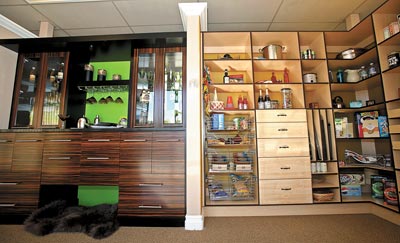Custom hang ups
What do Celine Dion, Penn Jillette, former Las Vegas Mayor Jan Jones or even you have in common with the early cavemen and Egyptians? Closets, lots of closets.
Early cavemen had little crevices cut into the walls of their caves where they hid things they cherished. The word "closet," according to the dictionary, means to hide things from sight. The earliest recorded design of a true walk-in closet occurred in 1580 B.C. in Egypt. The Egyptians constructed a series of apartments which included, for the first time, a walk-in storage area they called the "robing room" and where linen was stored on shelves. It wasn't until the 1850s that the first clothes hangers were designed to replace hooks inside stand-up clothes closets.
During the early 1890s, famed architect Frank Lloyd Wright began including large built-in closets in private homes he was designing in Chicago. The closets included shoe racks, hanging rods (instead of hooks) and even a self-storing ironing board. Today, all those things are included as part of your basic walk-in closet -- except the ironing board, unless, of course, you request it.
One of the leading manufacturers of custom closets, along with entertainment centers and kitchen cabinetry, is right here in Las Vegas. Crowne Closets & Cabinetry, located at 5030 W. Oquendo Road, can trace its beginnings to 1988 when pieces were created in a two-car garage and there was one rotary saw, one buzz saw and four employees. Today, the plant covers 55,000 square feet, has 115 employees and grosses more than $16 million annually.
Steven Mann, president, and Rick Denzler, who heads operations, are responsible for day-to-day operations and just sold equity to a Chicago firm with the intention of taking the business national.
"We have the most modern equipment that's available," said Don Wall, senior engineer for special projects, pointing to one machine: a $255,000 diamond cutter that can engrave any design on MDF wood, a delicate veneer, in just minutes.
When explaining the process of manufacturing custom closets, Wall said they can range from kitchen door replacements that cost as little as a $1,500 to a complete home package that costs as much as $60,000.
Wall said that costs vary based on the sophistication and complexity of a given project, and what materials the customer wants. Real wood is seldom used anymore.
"We can order a veneer that is incredibly beautiful and unusual in color and design which, unfortunately, is not always possible when a client requests real wood."
The process of creating custom cabinets usually begins with a phone call. Wall said an appointment is made with a designer, who arrives in the potential customer's home with a laptop computer. The design process starts in the home, using a simple system developed by Crowne. It is only after the design meets all of the customer's criteria, including selecting everything from handles to color and appearance, that production begins.
A typical home installation will take about two weeks from inception to completion, depending on complexity and materials.
Crowne has 20 men responsible for installation, who take great pride in what they do, Wall said. "We seldom have any call backs."
Dion, Jillette and Jones are just three of the thousands of custom home owners who have hired Crowne Closets & Cabinetry to design and install specially manufactured closets and entertainment centers. The company prides itself on giving the same special attention to all clients.
"We hear it all the time, 'Oh you're probably too expensive for us', when in reality we are not," Wall said.
Because the company buys supplies and materials in such huge quantities, it can, and does, pass the savings on to its customer.
"No job is too small or too big for us. We are extremely proud of our workmanship. Number one on our priority list is to make sure the customer is satisfied with the quality of our work following installation," Wall said.
To accomplish this, Denzler and Wall established a six-point checklist that examines shipping and receiving; panel processing; packaging and delivery; installation; final inspection by a field supervisor; and customer approval.
Departing from its traditional work, Crowne recently became involved in the beautification of Nevada's freeway and highway overpasses. The company just completed its first project, the bridge over Interstate 15 in Mesquite, under the supervision of Chad Goodfellow of Frehner Construction Co.
"They heard that we had a machine capable of cutting any design into any type of hard or soft material. Goodfellow approached us and asked if we would be interested in designing a façade for the sides of its bridges, once they were completed. The rest is history as they say in show biz," Wall said grinning.
For more information, call 739-0000.






















